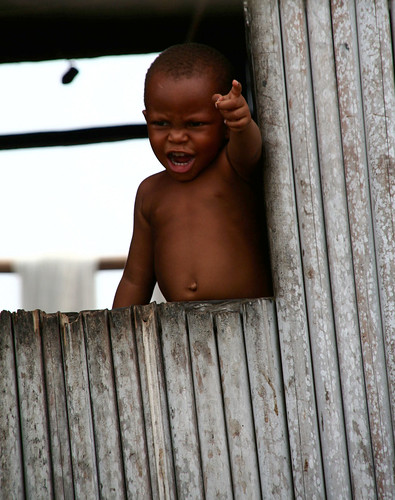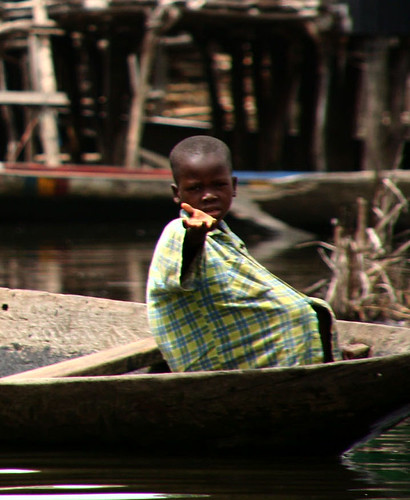
I write this post with the unsettling knowledge that I'm firmly ensconced as part of the problem. And I have no real solution to offer.
That said, it is never pleasant to watch the insidious descent of a group of people into the indenture of tourism.
Last weekend, in an effort to see the sights of southern Benin, a group of us took an hour-long, eighteen kilometer boat ride to Ganvié. Situated in the middle of a shallow lagoon, Ganvié has been around since the 1600s (at least), a village of refuge, built on stilts. According to the story, the Dahomey warriors were forbidden, by their religion, from entering the water. And, because their prey, the Tofinu people, were intent on avoiding subjugation by the warriors, they capitalized on this fact, escaped to Lake Nokoué, and set up their town.
Ganvié has been minding its own business ever since.
However, a more nefarious sort of subjugation has begun—one which has no respect for the spirits of the lake. Supposedly (this is only hearsay; I have no corroborating evidence), Ganvié first became more widely known after it featured in a National Geographic special a couple of decades ago. Whether or not that is true, there has definitely been an inexorable incursion of tourism into the town.  Hotels are being built (one proudly sports a banner on its front awning: Buses welcome!, it says, the absence of any paved roads evidently a just minor inconvenience). The traveller is seen as a purchaser of kitsch—the obligatory stop-at-my-cousin's-art-workshop was included—and, more importantly, as the provider of useless trinkets. So much so, in fact, that children mob you the minute you enter the town, performing handstands on the bows of their ramshackle canoes, asking you for chewing gum, pens, or money, and demanding (I kid you not) that you give them the sandwich you've half eaten. So much so that the outstretched palm is one of the first gestures learned here. So much so that children are taught the important phrases early: Monsieur Madame! Yovo!* Donne moi!
Hotels are being built (one proudly sports a banner on its front awning: Buses welcome!, it says, the absence of any paved roads evidently a just minor inconvenience). The traveller is seen as a purchaser of kitsch—the obligatory stop-at-my-cousin's-art-workshop was included—and, more importantly, as the provider of useless trinkets. So much so, in fact, that children mob you the minute you enter the town, performing handstands on the bows of their ramshackle canoes, asking you for chewing gum, pens, or money, and demanding (I kid you not) that you give them the sandwich you've half eaten. So much so that the outstretched palm is one of the first gestures learned here. So much so that children are taught the important phrases early: Monsieur Madame! Yovo!* Donne moi!
It's not a far reach from here to Kyrgyzstan.
This isn't a new phenomenon. In his Studies in Classic American Literature, DH Lawrence wrote
Behold then Septimus Dodge returning to Dodge-town victorious. Not crowned with laurel, it is true, but wreathed in lists of things he has seen and sucked dry. Seen and sucked dry, you know: Venus de Milo, the Rhine or the Coliseum: swallowed like so many clams, and left the shells.
Seen and sucked dry. It's the one unifying theme in so many disparate countries. The gestures are the same, the objectification unchanged (if understandable), the power differential ubiquitous. And to this ubiquity, I find no solution. Should we not visit? Should we not see? Should we not try to understand? Should we not be travellers?
I don't think so. As Byron, himself the quintessence of wanderlust, wrote in a letter to his mother:
I am so convinced of the advantages of looking at mankind instead of reading about them, and of the bitter effects of staying at home with all the narrow prejudices of an [Englishman], that I think there should be a law amongst us to set our young men abroad for a term among the few allies our wars have left us.
If this is the case—and I think it might be—how do we avoid leaving nothing behind but shells?






No comments:
Post a Comment